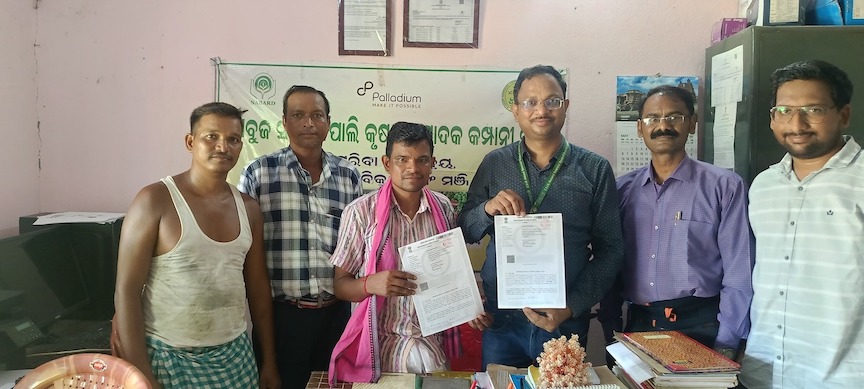In a significant move poised to transform the floriculture landscape in Odisha, Sabuja Sanatanpali Farmer Producer Company Limited (SSFPCL), the state’s first floriculture-based Farmer Producer Organization (FPO), has signed a MOU with the Council for Scientific and Industrial Research (CSIR) – National Botanical Research Institute (NBRI), Lucknow. Facilitated by Palladium, this collaboration aims to promote scientific research in floriculture, enhancing crop diversity, understanding plant-environment interactions, and applying biotechnological approaches for plant improvement, with a focus on economic viability. This initiative marks the first instance of an FPO in Odisha incorporating institutional applied research into its operational model to adapt to climate change and boost flower production and marketing, ultimately empowering farmers economically.
Odisha, with its 6,500 hectares dedicated to floriculture, produces approximately 24,800 metric tons of loose flowers and about 5,500 lakh cut flowers annually. However, this production meets only 10 percent of the state’s demand, forcing reliance on major cities like Calcutta, Bangalore, Delhi, and Hyderabad for flower supplies. This shortfall presents a lucrative opportunity for local entrepreneurs to delve into floriculture, a sector poised for growth.
Established in 2021 by Palladium as technical support unit and supported under the “Formation and Promotion of 10,000 FPOs under CSS scheme” by NABARD (National Bank for Agriculture and Rural Development), SSFPCL is located in the Jujumura forest area of Sambalpur district. It is the first FPO in Odisha focused on floriculture, making strides in addressing the state’s flower scarcity.
SSFPCL boasts over 1,200 small and marginal farmer members, with nearly 50 percent being women, overall benefitting 3500 farmers. This inclusivity underscores the organization’s commitment to gender equality in rural Odisha. Besides floriculture, SSFPCL sells a diverse range of agricultural products, including mangoes and vegetables such as cabbage, chili, cauliflower, and okra, produced by smallholder farmers.
It became the first FPO in the state to receive the highest matching equity grant from SFAC under the CSS 10,000 scheme in 2022. Recently, the FPO has received credit support from State Bank of India of INR 10 lakh for business operations. The FPO has established strong linkages between different departments such as the local horti/agri-officials and extension authorities like Krishi Vigyan Kendra (KVK). It has received input and post-harvest management support from the Directorate of Horticulture.
Dr. Chandra Sekhar Mohanty, Senior Principal Scientist at CSIR-National Botanical Research Institute in Lucknow, Uttar Pradesh, said,“Through this initiative, technical and scientific support will be provided to farmers of the farmer producer company. This includes quality planting materials, introduction of new plant varieties, performance evaluation in the local environment, training on agri-horticultural practices, and production of value-added products. These efforts will promote crop diversity and support the sustainable economic growth of the FPO.”
Biswajit, Director, Palladium India, said, “Accelerating inclusive business growth for the FPOs through promotion of climate smart agriculture models has been the key approach of Palladium. When we supported the Sabuja Sanatanpali Farmer producer company limited in 2021, we had set a clear vision – to promote it as one of the models FPOs demonstrating women economic empowerment through farmer collectives. It’s heartening to see emerging FPOs like Sabuja Sanatanpali integrating applied and scientific research through partnership with Council for Scientific and Industry Research – NBIR Govt of India in their production processes to enhance quality of production, respond to lower productivity due to climate change and aiming higher export markets. We aim to take it forward keeping market systems aligned.”
Disclaimer: This media release is auto-generated. The CSR Journal is not responsible for the content.


